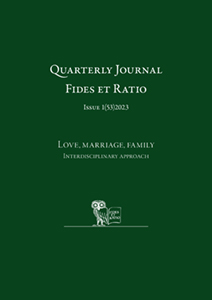Abstract
The article addresses the issues of parental attitudes of fathers, as assessed in retrospect by their daughters, currently in the period of early adulthood, in the context of the women’s self-esteem and stress management style. The aim of the research was to examine to what extent parental attitudes of fathers are correlated with the self-esteem of their adult daughters and the way in which they cope with difficult and stressful situations. It was assumed that fathers’ attitudes related to autonomy and acceptance are positively correlated with a higher level of overall self-esteem and all its components, as well as with a more effective, task-based stress management style. On the other hand, negative attitudes, including rejection, over-protective, excessively demanding attitude and inconsistency, were assumed to be correlated with a lower level of overall self-esteem and all its components, as well as less effective, emotional and avoidance-based coping style in stressful situations. The study group comprised 100 women in their early adulthood.
References
Adamsons, K., Pasley, K. (2016). Parents’ fathering identity standards and later father involvement. Journal of Family Issues, 37(2), 221-244.
Biernat, T. (2014). Czy istnieje rodzina ponowoczesna? Pedagogia Christiana, 2(34), 183-195.
Braun-Gałkowska, M. (2008). Psychologia domowa. Lublin: Wydawnictwo KUL.
Byrd-Craven, J., Auer, B.J., Granger, D.A., & Massey, A.R. (2012). The father daughter dance: The relationship between father–daughter relationship quality and daughters’ stress response. Journal of Family Psychology, 26(1), 87 94. https://doi.org/10.1037/a0026588
Coley, R.L. (1998). Children’s Socializations Experiences and Functioning in Single Mother Households The Importance of Fathers and Other Men. Child Development, 69(1), 219-230.
Dakowicz, A. (2014). Powodzenie małżeństwa. Białystok: Wydawnictwo Uniwersyteckie Trans Humana.
Fagan, J., Cherson, M. (2017). Maternal gatekeeping: The associations among facilitation, encouragement, and low-income fathers’engagement with young children. Journal of Family Issues, 38(5), 633-653.
Fecenec, D. (2008). Wielowymiarowy kwestionariusz samooceny MSEI – polska adaptacja. Warszawa: Pracownia Testów Psychologicznych PTP.
Gallegos, M.I., Jacobvitz, D.B., Sasaki, T., Hazen, N.L. (2019). Parents’ perceptions of their spouses’ parenting and infant temperament as predictors of parenting and coparenting. Journal of Family Psychology, 33, 542–553.
Grochal, J., Przyborowska, B. (2000). O wychowaniu człowieka. Płock: Szkoła Wyższa im. Pawła Włodkowica.
Harwas- Napierała, B., Trempała, J. (2000). Psychologia rozwoju człowieka. Tom 2. Warszawa: Wydawnictwo Naukowe PWN.
Kurcbart, A. (2011). Psychologiczny obraz ojca w biegu życia. Warszawa: Diffin.
Luber, M. (2021). Relacja z ojcem jako filar kształtowania tożsamości. (W:) K. Salomon, K. Kutek-Sładek, B. Karcz (red.). Teoretyczno empiryczne interpretacje tożsamości społecznej z uwzględnieniem perspektywy familiologii, 87–102. Kraków: Uniwersytet Papieski Jana Pawła II w Krakowie. Wydawnictwo Naukowe.
Mallers, M.H., Charles, S.T., Neupert, S.D., & Almeida, D.M. (2010). Perceptions of childhood relationships with mother and father: Daily emotional and stressor experiences in adulthood. Developmental Psychology, 46(6), 1651–1661. https://doi.org/10.1037/a0021020
McDowell, J., Wakefield, N. (1993). Zadziwiający wpływ tatusia. Warszawa: Vocatio.
Olcoń-Kubicka, M. (2009). Indywidualizacja a nowe formy wspólnotowości. Warszawa: Wydawnictwo Naukowe Scholar.
Ośkiewicz, W. (2012). Rola ojca w oddziaływaniach wychowawczych dziecka w rodzinie. Pedagogika Rodziny, 2(3), 99 -106.
Plopa, M. (2008). Kwestionariusz Retrospektywnej Oceny Postaw Rodziców (KPR-Roc). Warszawa: VIZJA PRESS&IT.
Pospiszyl, K. (2007). Ojciec a wychowanie dziecka. Warszawa: Wydawnictwo Akademickie Żak.
Sabaj-Sidur, M. (2018). Nadzieja na sukces i samoocena młodzieży a postrzeganie postaw rodziców. Lublin: Wydawnictwo KUL.
Senko, T. (2018). Charakterystyka zachowań osobowościowych między ojcem a dziećmi w rodzinie. Psychologiczne Zeszyty Naukowe, 1, 11-33.
Sosnowski, T. (2014). Pedagogiczny model ojcostwa- konstrukt teoretyczny. Dziecko Krzywdzone. Teoria, Badania, Praktyka, 13(3), 56-73.
Steinhilber, K.M., Rey, S., Harkins, D.A. (2020). Father–daughter relationship dynamics & daughters’ body image, eating patterns, and empowerment: An exploratory study. Women & Health, 60(1), 1-12.
Świętochowski, W. (2005). Kompetencje rodziny w radzeniu sobie ze stresem spowodowanym bezrobociem jednego z rodziców. Acta Universitatis Lodziensis. Folia Psychologica, 9, 41-53.
Tykarski, S. (2015). Problemy psychologiczne kobiet jako skutek deficytu obecności ojca w dzieciństwie. Studia Ełckie, 17(4), 391-404.
Walęcka-Matyja, K. (2019). Predykcyjna rola retrospektywnej oceny postaw rodzicielskich ojca a perfekcjonizm i samoocena kobiet w okresie wczesnej dorosłości. Psychiatria Polska, 53(2), 325-339.
Weryszko, M. (2021). Jakość małżeństwa a styl pełnienia roli ojca. Piotrków Trybunalski: Wydawnictwo Uniwersytetu Jana Kochanowskiego w Kielcach.
Weryszko, M. (2022). Jakość ojcostwa u mężczyzn z małżeństw o różnym poziomie satysfakcji. (W:) L. Bakiera (red.). Rodzicielstwo w zmieniającym się świecie, 135- 152. Poznań: Wydawnictwo Nauk Społecznych i Humanistycznych UAM.
Więcławska, A. (2020). Panorama problematyki współczesnego ojcostwa. Toruń: Wydawnictwo Edukacyjne Akapit.
Yan, J., Schoppe-Sullivan, S.J., Dush, K.M. (2018). Maternal coparenting attitudes and toddler adjustment: Moderated mediation through father’s positive engagement. Parenting, 18, 67-85.
Zia, A., Malik, A.A., Ali, M.A. (2015). Father and daughter relationship and its impact on daughter’s self-esteem and academic achievement. Academic Jurnal of Interdiscipinary Studies, 4(1), 311-316.
Zielińska-Król, K. (2013). Ojcostwo na początku XXI wieku – kryzys ojcostwa i ,,nowe” ojcostwo. Rocznik Nauk o Rodzinie, 5(60), 83-94.

